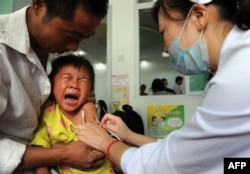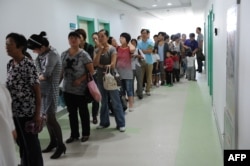China has vowed to tighten its regulation of locally-made vaccines to ensure their usefulness, after a recent scandal exposed regulatory loopholes.
The scandal involved the illegal sale of $47.6 million worth of improperly-refrigerated vaccines, which might have been administered to millions of children in 24 Chinese provinces since 2011, according to the country’s food and drug watchdog.
Authorities have filed 69 criminal cases against the alleged drug ring and the police have arrested more than 130 suspects, including the mastermind, a woman surnamed Pang from the northeastern province of Shandong.
Pang had been convicted for similar crimes, but was given a suspended sentence, which allowed her to re-offend, according to the nation’s top prescription drug regulator.
Regulatory weakness
Li Guoqing, head of the nation’s Food and Drug Administration told a news conference late Thursday that the tainted vaccines, including those used to prevent meningitis, rabies and other diseases, were legitimate, although they might have lost their potency after being stored improperly.
“A huge amount of vaccines had been circulated through illegal channels for such a long time, which the regulator had failed to uncover soon. This means that certain loopholes do exist in our regulatory work,” he said.
Li has vowed to close the loopholes, but failed to elaborate how his administration plans to tackle the challenge of not having enough people to do its job.
He added his organization is equipped with fewer than 500 certified drug inspectors to oversee the nation’s more than 5,000 vaccine makers, 400,000 retailers and 200,000 inoculation units.
“The regulator has put less of its strength on the transportation and storage [of vaccines] than that on their production. That has created room for irregularities,” said Wang Yuedan, deputy director of Peking University's immunology department.
“But I expect the regulation to toughen up after the incident,” the professor said, urging the government to facilitate an electronic identification system for end users to reconfirm the safety of their own vaccines before administering.
According to the regulator, the future distribution of such discretionary vaccines will be included and monitored under the provincial platform, where mandatory vaccines are distributed with transparency before they are administered free-of-charge.
Minimal safety risk
Wang also agreed with the assurances made by Li, who said the tainted vaccines should have posed minimal risk to the receivers, citing information from the World Health Organization (WHO).
On Tuesday, WHO released a statement saying “[an] improperly stored or expired vaccine seldom, if ever, causes a toxic relation — therefore there is likely to be minimal safety risk in this particular situation. Rather, the risk to children from administering expired or improperly stored vaccine is lack of protection from the disease for which the vaccine was intended,” the statement added.
Wang urged the government to fully track the whereabouts of tainted vaccine soon, so that parents can continue to protect their children from vaccine preventable diseases.
Public outcry
Already, the scandal has reawakened longstanding concerns among the public over the safety of food and medicine in China.
One angry Weibo user called the government a “bastard” after the regulator appeared to show complacency about the fact that most tainted vaccines were administered to people in remote agricultural villages.
Another mother from Fujian province expressed her worries, writing “my one-year-old was just given a shot of vaccine… I’m so troubled.”
Many others were reminded of the government’s tendency to cover up such issues.
Weibo user Chen Youxi said two journalists, Bao Yueyang and Wang Keqin from the China Economic Times, were removed from their jobs in 2010 after they exposed how a major failure to refrigerate vaccine had caused the death of four children and sickened 74 others in Shanxi province.
“In 2016, the [truth about the] vaccines has finally prevailed. China, when will you wake up?” he asked.
Moreover, on the freeweibo.com, the scandal has become the top-trending censored topic.
One user posted a scanned picture of the front-page headline of the Beijing Evening News from late 2014, which read “Our [Communist] Party rules China. If it continues to do poorly in food safety, many will question whether it is qualified to rule.”










